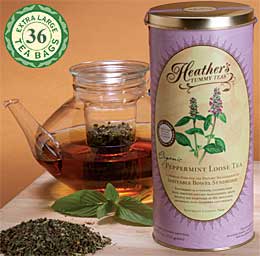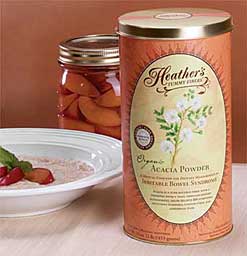| |

Did your email mangle this newsletter? Copy and paste this address into your browser window:
http://www.helpforibs.com/news/newsletter/092005.html or go here to see it online.
September 20, 2005
This week - Is wheat safe for IBS or not?
Hello to everyone -
This week we have a delicious fresh herb and pasta salad recipe, which is perfect for a light dinner or workday lunch. This recipe also serves as a good example of how wheat can be perfectly safe for IBS - but check out the "Ask Heather" column for why this is not always the case. We also have one last reminder about the fabulous Las Vegas IBS Fall Sprawl - don't miss out!
As always, we've also got the latest IBS news and research. Enjoy!
Best Wishes,
Heather Van Vorous
Did a friend send you this newsletter? Sign up here for your own free subscription.

Italian Tuna, Lemon, and Basil Pasta Salad
Makes 3 Servings (easily doubled)
Dressing:
juice from 2 lemons
1 tablespoon extra virgin olive oil
1 tablespoon fresh (or 1 1/4 teaspoon dried) parsley
1 tablespoon fresh (or 1 1 /4 teaspoon dried) dill
1 small clove garlic, minced and mashed to a paste with a dash of salt
8 oz. spaghetti, cooked until tender, drained, and rinsed with cold water
2 tablespoons finely shredded fresh basil leaves
2 tablespoons finely chopped scallions
1 medium fresh ripe tomato, diced
1/4 cup diced sweet white onion( such as Maui or Walla Walla)
6 oz. can of solid white albacore tuna
salt and pepper to taste
Whisk together all dressing ingredients. Combine remaining ingredients in two serving bowls and lightly toss to combine. Drizzle dressing over salad and serve.
For oodles of other delicious recipes, come visit the IBS Recipe Exchange board!
Are you just learning how to eat for IBS? A little intimidated at the thought of special IBS recipes? Not quite sure just what makes these recipes special in the first place? Don't worry! Come see
the IBS Diet pages, and find the answers to all your questions.
  
Fennel & Peppermint Tummy Teas - Now in New Jumbo Teabags!
Fennel is terrific for bloating & gas, Peppermint is great for IBS pain & spasms.
 Las Vegas IBS Fall Sprawl Just Two Weeks Away!
Las Vegas IBS Fall Sprawl Just Two Weeks Away!
It's almost time for the second annual IBS Fall Sprawl! This year's event is once again in Las Vegas, from September 30 to October 2. The IBS Fall Sprawl is organized by the fabulous Vegas Divas, Jennifer, Melissa, Kandee, and Shelley. The Divas took a brilliant idea ("Wouldn't it be great to meet all the people you chat with daily on the IBS Message Boards? Or have the opportunity to hang out with people who will identify with what you may go through on a daily basis with your IBS?") and turned it into an annual fun-filled event. In a nutshell, the IBS Fall Sprawl is an educational and social gathering that will put friends and soon-to-be friends in the same city for an outrageously good time in the city that never sleeps. We all had a blast last year and I hope to have an even better time this year!
For updated information, check the official Vegas Pages. If you would be interested in attending, or have any questions, please post them on the Let's Get Together Message Board, where you can also contact the Vegas Divas. Hope to see you there!
 Women and Men Perceive Pain Differently
Women and Men Perceive Pain Differently
A recent report in the Society for Women’s Health Researchn noted that pain seems to affect women and men differently, even at early ages. Studies have shown that women report pain more often than men. Certain studies even suggest that women can handle and cope with pain better than their male counterparts. Research has shown that male and female babies exhibit different responses to pain only hours after birth. Past studies suggest that men and women use different pathways in the brain when it comes to pain.
Chronic pain conditions affect women more frequently than men. Pain conditions often hit women harder during their childbearing years, suggesting that hormones play a role. Examining the way pain medications work may hold the key in understanding the differences between the sexes. Researchers at the University of California in San Francisco discovered that female patients achieved better pain control than male patients from kappa opioids, a well-known class of pain relievers. In 2000, Australian researchers at the University of New South Wales showed in a randomized controlled trial that ibuprofen, the active ingredient in several over-the-counter medications, works more effectively in men. The report concluded that more research is needed to further understand the role that gender plays in the response to pain and pain relief.
Go here for more
information about this study...
Increased Obesity in Children With Functional Constipation
a recent study in Pediatrics found that the overall prevalence of obesity was significantly higher in constipated children (22.4%) compared with control children (11.7%), and this higher prevalence was also seen for severe obesity. The prevalence rates of obesity were significantly higher in constipated males (25%) than in constipated females (19%) and were significantly higher compared with the control males (13.5%) and control females (9.8%). Constipated boys in all 3 age groups had significantly higher rates of obesity than the control boys; the constipated girls had significantly higher obesity rates for the age groups between 8 and 18 years. Fecal incontinence was present in 46% constipated children. The prevalence of obesity was similar in constipated children with and without fecal incontinence. The study concluded that there is a significantly higher prevalence of obesity in children with constipation compared with age- and gender-matched controls. The higher prevalence of obesity may be a result of dietary factors, activity level, or hormonal influences and needs additional evaluation.
Go here for more
information about this study...
IBS and Functional Dyspepsia: Different Diseases or a Single Disorder?
A recent Medscape article noted that functional gastrointestinal disorders (FGIDs) are common, chronic ailments that affect millions of adults on a daily basis. FGIDs are characterized by recurrent symptoms (ie, abdominal pain or discomfort, bloating, nausea, vomiting, early satiety, constipation, or diarrhea) that indicate a dysfunctional GI tract despite that an organic reason for the symptom generation is not identified on diagnostic studies.
It is estimated that 40% of all gastroenterology clinic visits are for FGIDs, and a recent survey of generalists and gastroenterologists found that nearly one third of their patient population had symptoms of irritable bowel syndrome (IBS). Many patients with IBS have dyspepsia; likewise, many patients with dyspepsia also have overlapping symptoms of IBS. These 2 groups of patients are similar in that symptoms are typically chronic in nature, may wax and wane, are aggravated by psychosocial stressors, and are often worsened by meals. In addition, both disorders are considered difficult to diagnose by many physicians and in the absence of warning signs or "red flags," extensive testing is unlikely to be helpful. These similarities raise the issue of whether IBS and dyspepsia are just different manifestations of the same disorder or whether they represent distinct clinical entities. Elucidating this clinical dilemma is important because it may improve our ability to diagnose and treat these common disorders.
Go here for more
information about this study...
Utility of Glycemic Index/Glycemic Load Questioned
A carefully controlled study designed to evaluate the influence of glycemic index / glycemic load (GI/GL) on glycemic response, appetite and food intake was published in the September 2005 issue of Diabetes Care. The researchers set out to either prove or disprove the believe held by some that diets with high GI/GL enhance appetite and promote weight gain. This is one of the first studies to control for other meal characteristics that are known to affect glycemic response (GR). These include the duration, nutrient composition, energy density, volume or weight, consistency and palatability of the meal. This study evaluated the effects of consuming high- and low-GI/GL meals on blood glucose and insulin, appetite and food intake.
The results indicated that there were no significant differences in plasma glucose or insulin responses, appetite ratings or food intake between treatments. This show that the glycemic response of foods tested in isolation does not hold true when meals are consumed ad lib over time. In other words the GI/GL of food is inconsequential in normal eating conditions.
Because appetite and intake are governed by a large array of food properties, attributing the treatment effects to the GI value of foods is very difficult. Many of the studies that have linked the two have not incorporated control subjects. As a result there is no way of knowing if the appetite and intake were affected by other factors. The above study sought to address many of these potentially confounding factors. These findings raise questions about the predictive power of the GI of a specific food or diet for either appetite or dietary responses
Go here for more
information about this study...
Oral Contraceptives and HRT a Risk Factor for IBD
A recent study in Alimentary Pharmacology and Therapeutics noted that the etiology of inflammatory bowel disease remains largely unknown. The study aimed to perform a comprehensive assessment of potential risk factors associated with the occurrence of inflammatory bowel disease. Among women, they found that long-term users of oral contraceptives were at increased risk of developing Ulcerative Colitis and Crohn's Disease. Similarly, long-term users of hormone replacement therapy had an increased risk of Crohn's but not UC. The researchers concluded that their study results support the hypothesis of an increased risk of inflammatory bowel disease associated with oral contraceptives use and suggest a similar effect of hormone replacement therapy on Crohn's.
Go here for more
information about this study...
Looking for more IBS research and news?
Check the IBS Research Library!

Shop at Heather's Tummy Store for IBS
HelpForIBS.com
The only store that's just for IBS - so we only carry the very best
 What about wheat?
What about wheat?
"Is wheat safe for IBS or not?"
More than almost any other food, wheat causes confusion for many people with IBS who are unsure about whether it is safe for them or not. What's a little tricky here is that there is no flat yes or no answer to this concern because for most people, it depends. Whole wheat, with its outer layer of bran, is high in insoluble fiber. This means that it's a trigger. That's why whole wheat bread, whole wheat cereals, and especially wheat bran can cause such awful problems for people with IBS.
Adding to the confusion about wheat is the unfortunate fact that many doctors still recommend high doses of bran to their IBS patients. Though there are numerous clinical studies showing that bran makes most people with IBS worse, not better, and despite the fact that these studies have been well-publicized for over ten years now, the "eat more bran" advice refuses to die its rightful death. If you've been given this advice and found through painful experience that it was not helpful, listen to your own body.
The good news about wheat, however, is that when you remove the bran from whole wheat you end up with white flour (the regular kind you can buy in any grocery store, that you use for home baking breads, muffins, etc.). Though this is still wheat flour, it is not whole wheat flour, and this makes a world of difference. White flour contains no insoluble fiber but it does have soluble fiber, which is the stabilizing force of the IBS diet (just picture the thick gel that results when you dissolve a piece of white bread in a glass of water). This is why white breads are such great safe staples.
When you read the ingredients on packaged foods they might not specify if the wheat flour used is "white" or "whole", but it's usually pretty easy to tell. For breads, a brief glance will tell you if there is whole wheat in it (you'll see little brown flakes). If the bread is pure white, like French or sourdough, you're safe. For most crackers, pretzels, muffins, etc. only white flour will be used. The exception is health food store products, which are likely to use whole wheat. However, they will almost always tout this fact so you won't be left wondering.
The whole wheat (and other insoluble fiber) intolerances so common to IBS are markedly different from true food allergies. If you're allergic to wheat, it will make no difference if the grain is left whole or refined by removing the bran. In addition, with many allergies even minuscule quantities of the trigger, whether eaten with other foods or alone, can trigger violent reactions. Fortunately, with IBS this is rarely the case, so we just have to be careful with whole wheat and other insoluble fibers. If we do take care we can easily and frequently eat them in small quantities when they're combined with high soluble fiber foods. (As always, taking care with insoluble fiber does not mean avoiding those foods altogether.) In addition, with wheat, once the bran has been removed so has the risk of an IBS attack, and this gives us great dietary freedom when it comes to white breads and other refined wheat flour foods (such as the Italian pasta salad recipe above).
Please note that there is a big difference between an intolerance to wheat due to the insoluble fiber content, and an intolerance to gluten. Gluten is a protein found in wheat and many other grains, and a gluten intolerance (celiac disease) is often misdiagnosed as IBS. More confusingly, celiac can also occur alongside IBS. This is particularly likely to happen when a gluten intolerance goes undiagnosed for a long enough period of time that the chronic gastrointestinal upsets result in a serious insult to the gut, which then leads to IBS. When someone ends up with both celiac and IBS, they need to combine the dietary restrictions for both disorders. This can be daunting at first, but it is certainly possible and well worth it for your good health.
~ Heather
~ Heather's Tummy Fiber ~For the Dietary Management of Abdominal Pain, Diarrhea, &, Constipation

Organic Acacia ~ Pure Soluble Fiber
The prebiotic fiber that relieves both diarrhea and constipation!
 Heather & Company for IBS, LLC is dedicated to serving people with Irritable Bowel Syndrome. Our mission is to provide education, support, and products that allow people with IBS to successfully manage their symptoms through lifestyle modifications.
Heather & Company for IBS, LLC is dedicated to serving people with Irritable Bowel Syndrome. Our mission is to provide education, support, and products that allow people with IBS to successfully manage their symptoms through lifestyle modifications.
We offer extensive information and tangible help for IBS, including the world's best-selling and best-reviewed books for the disorder. We provide the internet's top IBS web site resources; a twice-monthly IBS Newsletter; seminars and classes; dietary brochures for patient distribution by health care professionals; an IBS Research Library; and Heather Cooks!, a healthy cooking show on Seattle television. Much of our work is based on Heather's development of the first and only comprehensive IBS dietary guidelines and recipes, an achievement which has earned numerous awards and accolades as well as thousands of thank you letters from IBS sufferers.
Heather & Company also provides the only patient-expert moderated IBS Message Boards on the internet with forums for diet, recipes, hypnotherapy, yoga, plus Crohn's and Colitis. In addition, we support and coordinate the formation and continuation of local in-person IBS support groups across the USA, Canada, the UK, Australia, and New Zealand. We will soon have other IBS services and products available.
Our website receives nearly 3 million visits each year, and our newsletter is sent to over 43,000 people. We are regular exhibitors at the Digestive Disease Week and American Dietetic Association conferences.
Sponsorship opportunities are available for the message boards and this newsletter for companies and/or products that have been legitimately established as helpful for digestive disorders.
Please contact us for information.

You are receiving this email because you have expressed interest in IBS news and information.
To unsubscribe from Heather's IBS Newsletter, go here http://www.helpforibs.com/news/unsub.asp or send an email to help@helpforibs.com.
Change your newsletter email address here.
If you are viewing this newsletter on a website and would like to subscribe for email delivery, please "Join the IBS Newsletter" here.
ANTI-SPAM PRIVACY & SECURITY POLICY
LEGAL DISCLAIMER - This email is not intended to replace the services of a physician, nor does it constitute a doctor-patient relationship. Any application of the recommendations in this email is at the reader's discretion. Heather Van Vorous and Heather & Company for IBS, LLC are not liable for any direct or indirect claim, loss or damage resulting from use of this email and/or any web site(s) linked to/from it. Readers should consult their own physicians concerning the recommendations in this email.
HelpForIBS.com
Heather's Tummy Care
80 S. Washington St, #304
Seattle, WA 98104 USA
© 2005 Heather Van Vorous, Heather's Tummy Care. All rights reserved.
|
|
|